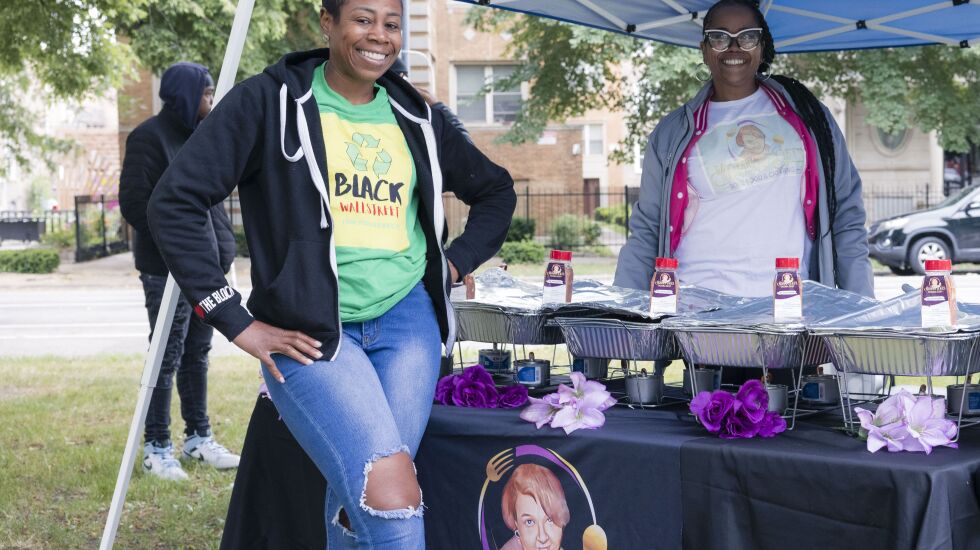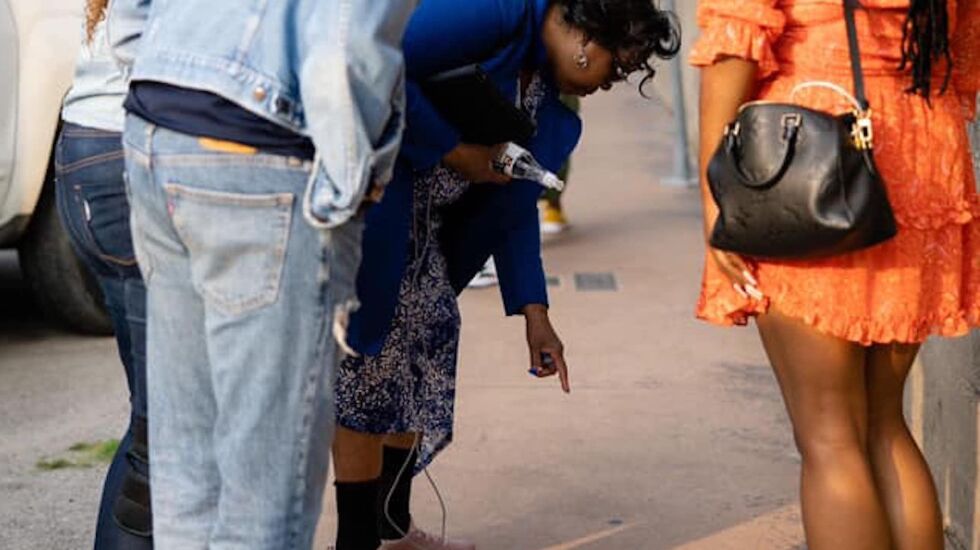
A pop-up market returning to North Lawndale this weekend takes its inspiration from a century-old tragedy and aims to re-create what was lost.
In 1921, white mobs rampaged through a thriving Black community in Tulsa, Oklahoma, looting businesses and homes.
The Tulsa race massacre, as it became known, ravaged an area known locally as the Greenwood District, and thanks to its success as Black Wall Street, the nation’s most prosperous Black-owned business district.
“They started with a small space, but then it just got so much bigger that they had a little town,” said Lavern Herron, 46, the Chicago woman behind the North Lawndale pop-up.
“That’s what we hope that this can be,” she said of her monthly summer pop-up, which started small two years ago, around the 100th anniversary of the massacre in Oklahoma.
Two years later, her market, also named Black Wall Street, is starting to thrive.
It will operate Saturday from noon to 5 p.m. at 3708 W. Roosevelt Road. The theme of the first event will be food, so most of the 20 vendors will offer everything from fresh salad to elote and barbecue. The other dates are July 8, Aug. 5 and Sept. 2. Potential themes on those other dates include music and fashion, Herron said.

“It’s about the camaraderie of the people,” she said. “It’s bigger than us just selling stuff to each other — we’re bringing the community together and spreading love and joy.”
The market also will pop up twice a month near Douglas Boulevard and Central Park Avenue as part of Sundays on the Boulevard, which will have around 10 vendors. The first was last Sunday and will be followed June 25, July 9, July 23, Aug. 13, Sept. 10 and Sept. 24. Vendors interested in participating can register on Herron’s website.
Herron said her goal is to promote Black-owned small businesses.
“The No. 1 reason was to recycle our money, network with other business owners and rebuild the community on our own — to build an economic circle,” she said.
Next to the pop-up is Vision Startup Studios, a beauty business incubator that Herron also started.
Herron’s work has drawn the attention of other West Siders.
Tina Augustus, executive director of the West Side Chamber of Commerce, called the pop-up a great symbol of the Tulsa neighborhood and of the West Side’s potential future.
“She has opened up her doors and invited all these businesses to come in and set up shop,” Augustus said. “I commend her for that.”
Augustus recently took a trip to the original Black Wall Street site in Tulsa, joined by other West Side community leaders. Huge swaths of that once-vibrant area remain empty, she said, and those vacant lots reminded her of Chicago.

“Can you imagine them all being together? It’s bigger than Columbus Park,” she said. “When you look around at the land in all directions, you feel the devastation.”
It reminded her of how initiatives like Herron’s market are just the start.
“The struggle continues with African Americans,” she said. “It continues, and we still have a lot of work ahead of us.”
Seeds of success in Soul City
Besides supporting initiatives like Black Wall Street, Augustus said the future lies in projects like the Soul City Corridor project to revitalize Chicago Avenue in the Austin neighborhood.
“That reminds me of Black Wall Street,” she said. “There’s a whole mile of businesses owned by Black people, from Cicero to Austin [avenues].”
Malcolm Crawford, president of the Austin African American Business Networking Association and manager for the Soul City Corridor project, said the goal is to “finally have a place in Chicago that is an economic driver and identifies Black people.”
Crawford said the effort has taken off in recent years, with small businesses opening in refurbished buildings and a streetscaping project that started at the end of May.
“If we get this right and have that destination point for African Americans, it changes a lot of stuff,” he said, adding that Black community leaders outside Chicago are following their progress.
These efforts symbolize hope, he said.
“Everybody puts their money in their cars and takes it out of the community,” he said. “It’s a hopeless feeling. But when it’s people that look like you, people you went to school with, it’s a great feeling.”
Herron’s market, Crawford noted, isn’t in the corridor, but it’s on the way, he said.
“It’s like a plant growing in the middle of a desert,” he said. “It makes me think this little glimmer we have on Chicago Avenue is starting to make other people think they can do it, too.”
Michael Loria is a staff reporter at the Chicago Sun-Times via Report for America, a not-for-profit journalism program that aims to bolster the paper’s coverage of communities on the South Side and West Side.







